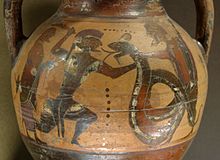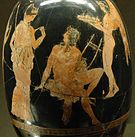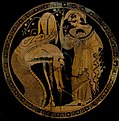Грчка митологија
| Грчка митологија |
|---|
 |
| Божанства |
| Хероји и хероизам |
| Повезано |

Грчка митологија је корпус митова који воде порекло из античке Грчке. Ове приче се баве пореклом и природом света, животом и активностима божанстава, хероја, и митолошких бића, као и пореклом и значењем култа и ритуала старих Грка. Савремени научници проучавају митове у покушају да расветле религијске и политичке установе античке Грчке и њене цивилизације и да стекну разумевање природе мита.[1]
Грчки митови су првобитно ширени усмено-поетичком традицијом, највјеројатније од стране минојских и микенских певача, почевши од 18. века пре нове ере;[2] и на крају у виду митова о херојима тројанског рата и његовим последицама, који су постали део усмене традиције преко Хомерових епова, Илијадае и Одисеје. Две песме Хомеровог савременика, Хесиода, Теогонија и Послови и дани, садрже приче о настанку света, наслеђу божанских владара, стварању човека, пореклу људских невоља и жртвених пракси. Митови су такође сачувани у Хомерским химнама, у одељцима епова о епском циклусу, у лирским песмама, трагедијама и комедијама из петог века пре нове ере, у научним и песничким списима хеленистичког доба и текстовима из времена римског царства, писаним од стране Плутарха и Паусаније.
Поред приповедачких налазишта античке Грчке књижевности, сликовити прикази богова, хероја и митолошких догађаја били су истакнути на древним вазама-сликама, украсима заветованих жртава и многим другим артефактима. Геометријски нацрти на керамици из осмог века пре нове ере приказују сцене из тројанског циклуса као и Хераклове подвиге. У наставку архајског, класичног и хеленистичког периода, појављују се Хомерске и разне друге митолошке сцене, које допуњују постојеће књижевне изворе.[3]
Грчка митологија је имала велики утицај на културу, уметност и књижевност западњачких цивилизација и остаје део њиховог културног наслеђа и језика. Песници и сликари су од античког доба до данас вукли инспирацију из грчке митологије и открили су савремени значај и релевантност у уметничким темама.[4]

Настанак света
[уреди | уреди извор]По грчком миту, у почетку су небо и земља били измешани и владао је Хаос. Затим су се из Хаоса издвојили богиња Геја - земља и Уран - небо. Њих двоје изродили су остале богове - титане. Међутим, Уран бојећи се да му неко од деце не преузме власт затвори титане под земљу. Међутим, један бог - Хронос успео је да изађе из провалије и да ослободи осталу браћу и сестре. Тада, као што се Уран и бојао, Хронос одузме власт оцу и постаде господар света. Међутим, Хроноса је затекла иста судбина као и његовог оца, јер га је свргнуо са власти његов млађи син - Зевс.
Настанак људи
[уреди | уреди извор]У почетку, Грци су мислили да су људи никли из земље попут биљака, међутим временом је то веровање одбачено и мислило се да је титан Прометеј од глине направио човека, а да му је Атена удахнула душу. Прометеј је људе штитио, помагао им и учио их. Од Аполона је украо ватру и дао је људима, ухватио је дивљег бика и дао људима да га упрегну, научио их је како да ваде руде. Због свега овога Зевс се наљутио и наређено је да Прометеј буде окован гвозденим ланцима и на Кавказу он беше прикован за једну стену где је сваки дан слетао орао који му је кљуцао јетру. Прометеј је дуго овако висио док га Херакле није ослободио.
Хероји
[уреди | уреди извор]У грчкој митологији спомињу се и полубогови, који се називају херојима. Они имају натчовечанску снагу, памет, спретност. Обично су били синови богова и смртника, заштитници људи, убице чудовишта и разбојника. Најпознатији грчки хероји јесу Херакле (Хераклес, Херкулес, Херкул), Тезеј, Јасон, Персеј, Диоскури.
Грчки митови
[уреди | уреди извор]Неки од најпознатијих грчких митова су:
- Прометеј
- Персеј
- Дедал и Икар
- Адонис
- Мида
- Аталанта
- Тантал
- Дионис
- Сизиф
- Орфеј и Еуридика
- Херакле
- Тезеј
- Медеја
- Илијада
- Пандора
- Одисеја
- Диоскури
- Аргонаути
- Персефона
Референце
[уреди | уреди извор]- ^ „Volume: Hellas, Article: Greek Mythology”. Encyclopaedia The Helios. 1952.
- ^ Cartwirght, Mark. „Greek Mythology”. Ancient History Encyclopedia. Приступљено 26. 3. 2018.
- ^ „Greek Mythology”. Encyclopædia Britannica. 2002.
- ^ J.M. Foley, Homer's Traditional Art, 43
Литература
[уреди | уреди извор]- Grevs, Robert (2002). Grčki mitovi. Beograd: Familet. ISBN 978-86-7646-007-6.
- Aeschylus, The Persians. See original text in Perseus program.
- Aeschylus, Prometheus Bound. See original text in Perseus program.
- Apollodorus, Library and Epitome. See original text in Perseus program.
- Apollonius of Rhodes, Argonautica, Book I. See original text in Sacred Texts.
- Cicero, De Divinatione. See original text in the Latin Library.
- Cicero, Tusculanae resons. See original text in the Latin Library.
- Herodotus, The Histories, I. See original text in the Sacred Texts.
- Hesiod, Works and Days. Translated into English by Hugh G. Evelyn-White.
- Hesiod (1914). Theogony. Превод: Hugh Gerard Evelyn-White — преко Викизворника.
- Homer, Iliad. See original text in Perseus program.
- Homeric Hymn to Aphrodite. Translated into English by Gregory Nagy.
- Homeric Hymn to Demeter. See original text in Perseus project.
- Homeric Hymn to Hermes. See the English translation in the Medieval and Classical Literature Library Архивирано на сајту Wayback Machine (25. октобар 2008).
- Ovid, Metamorphoses. See original text in the Latin Library.
- Pausanias.
- Pindar, Pythian Odes, Pythian 4: For Arcesilas of Cyrene Chariot Race 462 BC. See original text in the Perseus program.
- Plato, Apology. See original text in Perseus program.
- Plato, Theaetetus. See original text in Perseus program.
- Ackerman, Robert (1991). „Introduction”. Prolegomena to the Study of Greek Religion by Jane Ellen Harrison (Reprint изд.). Princeton University Press. ISBN 978-0-691-01514-9.
- G, Albala Ken; Durst, Johnson Claudia; Johnson Vernon E. (2000). „Origin of Mythology”. Understanding the Odyssey. Courier Dover Publications. ISBN 978-0-486-41107-1.
- Algra, Keimpe (1999). „The Beginnings of Cosmology”. The Cambridge Companion to Early Greek Philosophy. Cambridge University Press. ISBN 978-0-521-44667-9.
- Allen, Douglas (1978). „Early Methological Approaches”. Structure & Creativity in Religion: Hermeneutics in Mircea Eliade's Phenomenology and New Directions. Walter de Gruyter. ISBN 978-90-279-7594-2.
- „Argonaut”. Encyclopædia Britannica. 2002.
- Betegh, Gábor (2004). „The Interpretation of the poet”. The Derveni Papyrus. Cambridge University Press. ISBN 978-0-521-80108-9.
- Bonnefoy, Yves (1992). „Kinship Structures in Greek Heroic Dynasty”. Greek and Egyptian Mythologies. University of Chicago Press. ISBN 978-0-226-06454-3.
- Bulfinch, Thomas (2003). „Greek Mythology and Homer”. Bulfinch's Greek and Roman Mythology. Greenwood Press. ISBN 978-0-313-30881-9.
- Burkert, Walter (2002). „Prehistory and the Minoan Mycenaen Era”. Greek Religion: Archaic and Classical (translated by John Raffan). Blackwell Publishing. ISBN 978-0-631-15624-6.
- Burn, Lucilla (1990). Greek Myths. University of Texas Press. ISBN 978-0-292-72748-9.
- Bushnell, Rebecca W. (2005). „Helicocentric Stoicism in the Saturnalia: The Egyptian Apollo”. Medieval A Companion to Tragedy. Blackwell Publishing. ISBN 978-1-4051-0735-8.
- Chance, Jane (1994). „Helicocentric Stoicism in the Saturnalia: The Egyptian Apollo”. Medieval Mythography. University Press of Florida. ISBN 978-0-8130-1256-8.
- Caldwell, Richard (1990). „The Psychoanalytic Interpretation of Greek Myth”. Approaches to Greek Myth. Johns Hopkins University Press. ISBN 978-0-8018-3864-4.
- Calimach, Andrew (2002). „The Cultural Background”. Lovers' Legends: The Gay Greek Myths. Haiduk Press. ISBN 978-0-9714686-0-3.
- Cartledge, Paul A. (2002). „Inventing the Past: History v. Myth”. The Greeks. Oxford University Press. ISBN 978-0-19-280388-7.
- Cartledge, Paul A. (2004). The Spartans (translated in Greek). Livanis. ISBN 978-960-14-0843-9.
- Cashford, Jules (2003). „Introduction”. The Homeric Hymns. Penguin Classics. ISBN 978-0-14-043782-9.
- Dowden, Ken (1992). „Myth and Mythology”. The Uses of Greek Mythology. Routledge (UK). ISBN 978-0-415-06135-3.
- Dunlop, John (1842). „Romances of Chivalry”. The History of Fiction. Carey and Hart. ISBN 978-1-149-40338-9.
- Edmunds, Lowell (1980). „Comparative Approaches”. Approaches to Greek Myth. Johns Hopkins University Press. ISBN 978-0-8018-3864-4.
- „Euhemerus”. Encyclopædia Britannica. 2002.
- Foley, John Miles (1999). „Homeric and South Slavic Epic”. Homer's Traditional Art. Penn State Press. ISBN 978-0-271-01870-6.
- Gale, Monica R. (1994). „The Cultural Background”. Myth and Poetry in Lucretius. Cambridge University Press. ISBN 978-0-521-45135-2.
- „Greek Mythology”. Encyclopædia Britannica. 2002.
- „Greek Religion”. Encyclopædia Britannica. 2002.
- Griffin, Jasper (1986). „Greek Myth and Hesiod”. The Oxford Illustrated History of Greece and the Hellenistic World edited by John Boardman, Jasper Griffin and Oswyn Murray. Oxford University Press. ISBN 978-0-19-285438-4.
- Grimal, Pierre (1986). „Argonauts”. The Dictionary of Classical Mythology. Blackwell Publishing. ISBN 978-0-631-20102-1.
- Hacklin, Joseph (1994). „The Mythology of Persia”. Asiatic Mythology. Asian Educational Services. ISBN 978-81-206-0920-4.
- Hanson, Victor Davis; Heath, John (1999). Who Killed Homer (translated in Greek by Rena Karakatsani). Kakos. ISBN 978-960-352-545-5.
- Hard, Robin (2003). „Sources of Greek Myth”. The Routledge Handbook of Greek Mythology: based on H. J. Rose's "A Handbook of Greek mythology". Routledge (UK). ISBN 978-0-415-18636-0.
- „Heracles”. Encyclopædia Britannica. 2002.
- Jung Carl Gustav, Kerényi Karl (2001). „Prolegomena”. Essays on a Science of Mythology (Reprint изд.). Princeton University Press. ISBN 978-0-691-01756-3.
- Jung, C.J. (2002). „Troy in Latin and French Joseph of Exeter's "Ylias" and Benoît de Sainte-Maure's "Roman de Troie"”. Science of Mythology. Routledge (UK). ISBN 978-0-415-26742-7.
- Kelly, Douglas (2003). „Sources of Greek Myth”. An Outline of Greek and Roman Mythology. Douglas Kelly. ISBN 978-0-415-18636-0.
- Kelsey, Francis W. (1889). A Handbook of Greek Mythology. Allyn and Bacon.
- Kirk, Geoffrey Stephen (1973). „The Thematic Simplicity of the Myths”. Myth: Its Meaning and Functions in Ancient and Other Cultures. University of California Press. ISBN 978-0-520-02389-5.
- Kirk, Geoffrey Stephen (1974). The Nature of Greek Myths. Harmondsworth: Penguin. ISBN 978-0-14-021783-4.
- Klatt J. Mary, Brazouski Antoinette (1994). „Preface”. Children's Books on Ancient Greek and Roman Mythology: An Annotated Bibliography. Greenwood Press. ISBN 978-0-313-28973-6.
- Lexicon Iconographicum Mythologiae Classicae. Artemis-Verlag. 1981—1999. Недостаје или је празан параметар
|title=(помоћ) - Miles, Geoffrey (1999). „The Myth-kitty”. Classical Mythology in English Literature: A Critical Anthology. University of Illinois Press. ISBN 978-0-415-14754-5.
- Morris, Ian (2000). Archaeology As Cultural History. Blackwell Publishing. ISBN 978-0-631-19602-0.
- „myth”. Encyclopædia Britannica. 2002.
- Nagy, Gregory (1992). „The Hellenization of the Indo-European Poetics”. Greek Mythology and Poetics. Cornell University Press. ISBN 978-0-8014-8048-5.
- Nilsson, Martin P. (1940). „The Religion of Eleusis”. Greek Popular Religion. Columbia University Press.
- North John A.; Mary, Beard; Price Simon R.F. (1998). „The Religions of Imperial Rome”. Classical Mythology in English Literature: A Critical Anthology. Cambridge University Press. ISBN 978-0-521-31682-8.
- Papadopoulou, Thalia (2005). „Introduction”. Heracles and Euripidean Tragedy. Cambridge University Press. ISBN 978-0-521-85126-8.
- Percy, William Armostrong III (1999). „The Institutionalization of Pederasty”. Pederasty and Pedagogy in Archaic Greece. Routledge (UK). ISBN 978-0-252-06740-2.
- Poleman, Horace I. (март 1943). „Review of "Ouranos-Varuna. Etude de mythologie comparee indo-europeenne by Georges Dumezil"”. Journal of the American Oriental Society. 63 (1): 78—79. ISSN 0003-0279. JSTOR 594160. doi:10.2307/594160.
- Reinhold, Meyer (20. 10. 1970). „The Generation Gap in Antiquity”. Proceedings of the American Philosophical Society. 114 (5): 347—65. JSTOR 985800.
- Rose, Herbert Jennings (1991). A Handbook of Greek Mythology. Routledge (UK). ISBN 978-0-415-04601-5.
- Segal, Robert A. (1991). „A Greek Eternal Child”. Myth and the Polis edited by Dora Carlisky Pozzi, John Moore Wickersham. Cornell University Press. ISBN 978-0-8014-2473-1.
- Segal, Robert A. (4. 4. 1990). „The Romantic Appeal of Joseph Campbell”. Christian Century. Архивирано из оригинала 7. 1. 2007. г.
- Segal, Robert A. (1999). „Jung on Mythology”. Theorizing about Myth. Univ of Massachusetts Press. ISBN 978-1-55849-191-5.
- Stoll, Heinrich Wilhelm (translated by R. B. Paul) (1852). Handbook of the religion and mythology of the Greeks. Francis and John Rivington.
- Trobe, Kala (2001). „Dionysus”. Invoke the Gods. Llewellyn Worldwide. ISBN 978-0-7387-0096-0.
- „Trojan War”. Encyclopaedia The Helios. 1952.
- „Troy”. Encyclopædia Britannica. 2002.
- „Volume: Hellas, Article: Greek Mythology”. Encyclopaedia The Helios. 1952.
- Walsh, Patrick Gerald (1998). „Liberating Appearance in Mythic Content”. The Nature of the Gods. Oxford University Press. ISBN 978-0-19-282511-7.
- Weaver, John B. (1998). „Introduction”. The Plots of Epiphany. Walter de Gruyter. ISBN 978-3-11-018266-8.
- Winterbourne, Anthony (2004). „Spinning and Weaving Fate”. When the Norns Have Spoken. Fairleigh Dickinson University Press. ISBN 978-0-8386-4048-7.
- Wood, Michael (1998). „The Coming of the Greeks”. In Search of the Trojan War. University of California Press. ISBN 978-0-520-21599-3.
- Gantz, Timothy (1993). Early Greek Myth: A Guide to Literary and Artistic Sources. Johns Hopkins University Press. ISBN 978-0-8018-4410-2.
- Graves, Robert (1993) [1955]. The Greek Myths (Cmb/Rep изд.). Penguin (Non-Classics). ISBN 978-0-14-017199-0.
- Hamilton, Edith (1998) [1942]. Mythology (New изд.). Back Bay Books. ISBN 978-0-316-34151-6.
- Kerenyi, Karl (1980) [1951]. The Gods of the Greeks (Reissue изд.). Thames & Hudson. ISBN 978-0-500-27048-6.
- Kerenyi, Karl (1978) [1959]. The Heroes of the Greeks (Reissue изд.). Thames & Hudson. ISBN 978-0-500-27049-3.
- Luchte, James (2011). Early Greek Thought: Before the Dawn. Bloomsbury. ISBN 978-0-567-35331-3.
- Morford M.P.O., Lenardon L.J. (2006). Classical Mythology. Oxford University Press. ISBN 978-0-19-530805-1.
- Pinsent, John (1972). Greek Mythology. Bantam. ISBN 978-0-448-00848-6.
- Pinsent, John (1991). Myths and Legends of Ancient Greece. Library of the World's Myths and Legends. Peter Bedrick Books. ISBN 978-0-87226-250-8.
- Powell, Barry (2008). Classical Myth (6th изд.). Prentice-Hall. ISBN 978-0-13-606171-7.
- Powell, Barry (2001). A Short Introduction to Classical Myth. Prentice-Hall. ISBN 978-0-13-025839-7.
- Ruck Carl, Staples Blaise Daniel (1994). The World of Classical Myth. Carolina Academic Press. ISBN 978-0-89089-575-7.
- Smith, William (1870), Dictionary of Greek and Roman Biography and Mythology.
- Veyne, Paul (1988). Did the Greeks Believe in Their Myths? An Essay on Constitutive Imagination. (translated by Paula Wissing). University of Chicago. ISBN 978-0-226-85434-2.
- Woodward, Roger D. (editor) (2007). The Cambridge Companion to Greek Mythology. Cambridge; New York: Cambridge University Press. ISBN 978-0-521-84520-5.
- Nilsson, Martin P. (април 2009). The Mycenaean Origin of Greek Mythology. BiblioBazaar. ISBN 9780559057984.
Спољашње везе
[уреди | уреди извор]- Library of Classical Mythology Texts translations of works of classical literature
- LIMC-France Архивирано на сајту Wayback Machine (25. јун 2016) provides databases dedicated to Graeco-Roman mythology and its iconography.








